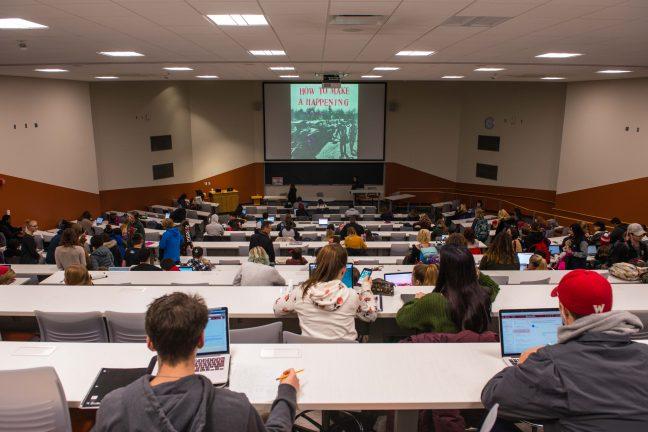I didn’t learn how to use Excel at my internship. I didn’t learn how to navigate the HTML code of my office’s website from my intern handbook, and it wasn’t my boss who taught me about the ins and outs of social media.
I learned those skills either on my own, or — as with many career-applicable skills — in my classes.
Employers expect young applicants to have a certain level of digital literacy — it’s listed in the job requirements of most internship and job applications, and as employees and interns, that expectation is made clear to us on the first day of work.
Research supports these experiences, too. A 2017 study found that 82 percent of middle-skilled jobs require digital skills. This is a 4 percent increase since 2015, and it’s safe to say we probably haven’t reversed that progression in the past two years.
What’s more, baseline digital skills alone have been shown to yield a 17 percent premium in pay over non-digital roles.
The study concluded that digital skills “[serve] as a door opener to the middle-skill market” and “[provide] career advancement in lieu of advanced education.”
So digital skills are important. These aren’t shocking results for those of us who haven’t been living under a rock.
How the Wisconsin Idea has retained foundational vitality in face of sweeping change
What is shocking (though at this point, maybe it’s not anymore), is the inequity with which students have access to gain these skills so essential in today’s job market.
A 2015 study found that of 27,450 Madison public school students surveyed, 12 percent did not have reliable internet access — a reality which makes it difficult to complete the homework assigned to them. That’s well over 3,000 students falling behind in school because of circumstances out of their control.
This issue of access disproportionately affects low-income students. The same study found that 21 percent of low-income students did not have internet access, while just 4 percent of non-low-income students lacked access.
The Pew Research Center found similar results in a 2018 nationwide study.

“School-age children in lower-income households are especially likely to lack broadband access. This aspect of the digital divide – often referred to as the “homework gap” – can be an academic burden for teens,” the Center reported.
Though this research was conducted with a focus on elementary-age children, these problems don’t just disappear when students arrive at college.
The University of Wisconsin recommends that students bring a laptop to campus — an expense which can run up a bill in the thousands of dollars. Many classrooms require purchase of subscriptions to online learning tools, such as TopHat or Cengage, which can cost more than $100 for just one semester.
And while there are ways around these expectations, like buying a used laptop or applying for financial assistance with educational programs, the presumption that all students can just contribute these expenses in addition to tuition costs is a discriminatory practice.
High speed, city-wide broadband network too expensive to implement
With that in mind, some have suggested that the solution is to do away with technology in the classroom. But that solution is neither clever nor innovative — it simply pushes the problem down the line to when students are trying to apply to jobs for which they will inevitably lack the necessary digital literacy.
The solution is to account for these disparities in education and work to equalize the use of technology in school.
It is the charge of a university to prepare its students for the world with life skills, career skills and academic skills. Here at UW, the Wisconsin Idea signifies the principle that “education should influence people’s lives beyond the boundaries of the classroom.”
That includes career preparation that is representative of the job market students will be entering.
Bucky Promise takes first step in rejecting exploitative, inaccessible education system
Last summer, the University of Pittsburgh announced that TopHat would be available to all students free of charge.
Earlier this July, the University of Virginia’s College at Wise announced they would be providing all full-time students with iPads and smart keyboards in an effort to “bridge the technology gap.”
Handing out free laptops isn’t the only way to address unequal access to educational technology, either. A number of universities have launched initiatives teaming up with tech companies to provide students with digital training, specifically in skills applicable to the workforce.
Technology can be exciting, and it has the potential to do great things for students and education, but we have to choose to use it in a conscious and innovative way.
In 1894, the UW Board of Regents asserted, “We believe that the great state University of Wisconsin should ever encourage that continual and fearless sifting and winnowing by which alone the truth can be found.”
Though nearly 150 years old, this assertive defense of academic and intellectual freedom continues to guide Badgers’ educational philosophy — and therein lies the genius of the authors of that statement. What exactly “sifting and winnowing” means will change — today that seems to mean technological and digital literacy — but regardless of the logistical definition, the goal remains ever important.
Cait Gibbons ([email protected]) is a senior studying math and Chinese.




















